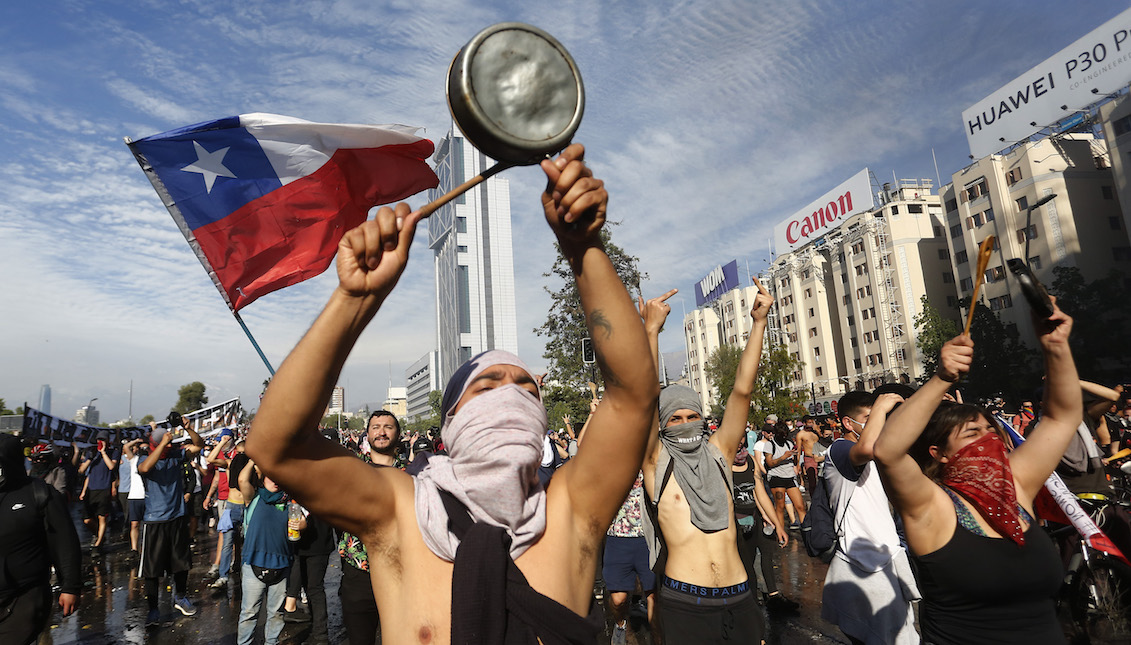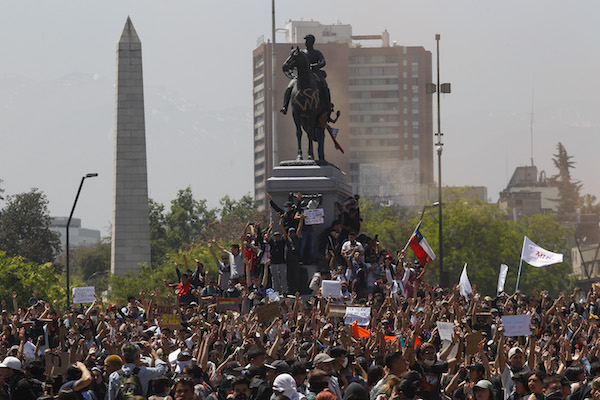
A brief summary of the conflict in Chile
The main cities of the South American country have been hotbeds of demonstrations against the economic measures of President Sebastián Piñera.
Since last October 6, the people of Chile have joined other countries such as Ecuador and Bolivia in expressing their widespread discontent against the way of doing politics in Latin America.
After the announcement of President Sebastián Piñera to increase the price of the Metro ticket from 800 to 830 pesos on the recommendation of his advisors in public transport, the patience of the public seemed to reach the limit.
According to national media reports, students from the Metropolitan Region decided to evade payment both in the subway and in buses as a protest, which initiated a series of obstructions in the service.
Soon the protests escalated, with the burning of several subway stations and clashes between citizens and law enforcement in the streets of several cities.

For the night of October 18, the largest cities in Chile were undermined by protests in all the streets and clashes with the police, to which President Piñera responded by declaring a state of emergency and curfew starting at 6 PM.
Apparently, the excessive reaction of the protesters - who soon saw thrashes of looting and burning of establishments - was due to much more than the increase in transport.
Thousands of people began to focus on key city centers and demand the resignation of the president, echoing protest songs from the time of the military dictatorship of Augusto Pinochet during the 70s and 80s.
Several people explained to the Deutsche Welle the demonstrations were a symbol of the tiredness of citizenship in the face of "the famine and inequality of the country."
Since the return of democracy in the early 1990s, Chile has been a country that has been rebuilt at a dizzying speed, but in exchange for a deep social disparity.
A political division marked by the violence of the Pinochet regime against deserters and militants of the communist party, plus the growth of one of the wildest economies in Latin America, has put much of the people at the bottom of the social scheme.
The worst of Chileans' nightmares returned to the streets when President Piñera announced that the riots were "a war" and authorized the departure of Chilean Army forces to the streets, a frequent image during the Pinochet dictatorship.
"We are at war against a powerful and relentless enemy who does not respect anything or anyone and who is willing to use violence without any limits, even when it means the loss of human lives, with the sole purpose of producing as much damage as possible," Piñera told the media on Sunday.
RELATED CONTENT
However, the streets did not yield, and they continue to challenge the true cost of the Chilean "economic miracle," which has imposed on the country one of the highest rates of economic inequality in the region.

According to the Economic Commission for Latin America and the Caribbean (ECLAC), only 1% of the population in Chile controls 26.5% of the country's wealth, while 50% of low-income households access only 2.1 %, the BBC explained.
While the minimum wage is around $ 423 per month, half of the workers barely reach $ 562, according to figures from the National Statistics Institute of Chile.
And it's not just about public transport.
The high cost of privatized services such as electricity and water, plus the multi-million dollar monopoly of the health and education systems make rend impossible an equal development of all social strata.
As explained by the political analyst Diego Olivera Evia, director of the International Barometer, the Chilean crisis is a consequence of “the neoliberal capitalist model that has been parked in Latin America and that is generating a very large crisis of values.”
For her part, researcher Kathya Araujo, who has studied the experience of users in the Chilean subway, explained this means of public transport "has become a kind of metaphor for what was happening in society."
The sociologist explains how, despite being one of the most modern transport networks in the world, each of its stations works “as an embodiment of inequality,” where you can identify the social layers in each station.
Although President Piñera announced the proposal to suspend the rise in the price of public transport, few believe that an agreement between the branches of government can placate discontent and anger accumulated over decades in the heart of the Chileans.











LEAVE A COMMENT: